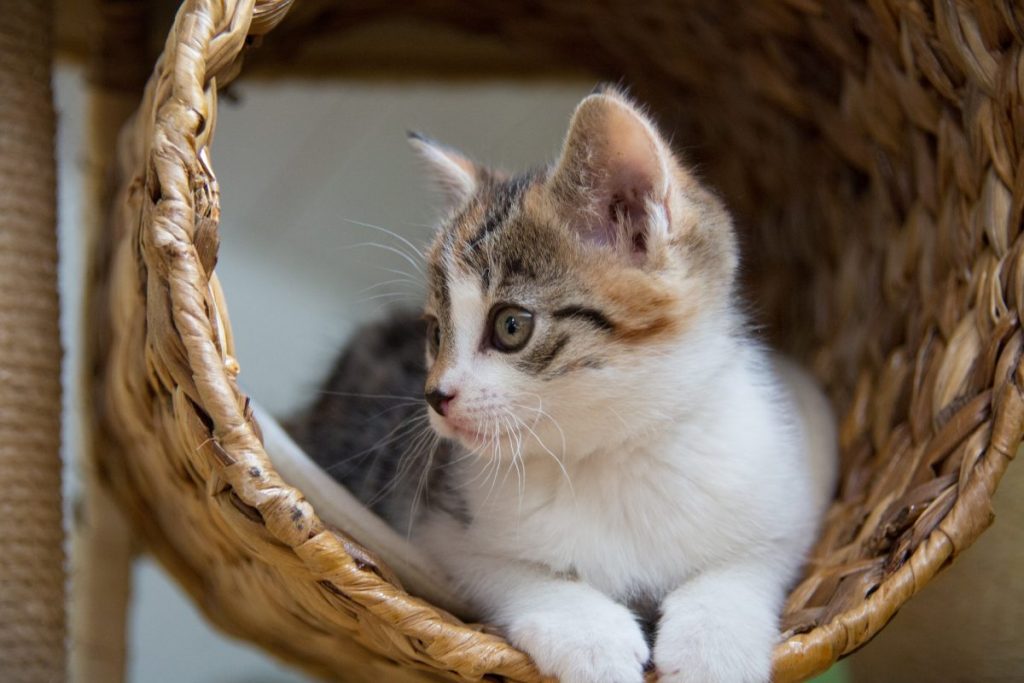Just like humans and dogs, cats can develop allergic reactions to their food and environment. This happens when your cat’s immune system is especially sensitive to particular everyday substances and begins to view them as harmful.
Even though these substances are commonly used in many environments and pose no threat to most animals, a cat with allergies will have an extreme reaction to them as their body tries to rid itself of these allergens.
General Cat Allergy Symptoms
Your cat may develop one or more of the following allergy symptoms if he is experiencing an allergic reaction, including:
- Coughing, sneezing, or wheezing
- Itchy skin and increased scratching
- Watery eyes
- An itchy back or base of the tail, most commonly occurring in flea allergies
- Vomiting and diarrhea
- Itchy ears or ear infections
- Snoring caused by an inflamed throat
- Swollen paws or paw chewing
Common Allergens for Cats
Your cat can develop an allergy to a number of items in his environment, including:
- Grass, mildew, mold, dust pollens, trees, or weeds
- Food
- Fleas and flea-control products
- Cleaning materials
- Cigarette smoke
- Prescription medication
- Perfumes
- Fabrics
- Rubber and plastic materials
- Cleaning products
Most Common Food Allergies in Cats
Food allergies in cats account for about 10 percent of all allergies present in felines. It is the third most common cause of allergies after flea bite allergies and atopy (inhalant allergies) and accounts for 57 percent of the itching and scratching found in cats.
The most common food allergy offenders for cats include beef, corn, lamb, soy, dairy products, and wheat gluten.
The diagnosis for food allergies in cats is pretty straightforward. Once all other causes, such as atopy, flea allergy bites, and yeast or bacterial infections, have been ridden out, your vet will perform a food trial.
A food trial for cats with allergies consists of feeding your feline a novel food source of protein and carbs for 12 weeks. A novel food source contains proteins and carbs that your pet has never eaten before, including duck and potato or venison and potato.
It is critical that these are the only items your cat eats for 12 weeks, meaning that you should not feed him treats or flavored medication. Additionally, your cat should not be allowed to roam around outside as she could get into food scraps or garbage.
While there are no cures for food allergies, the biggest treatment for them is avoidance. Once the offending ingredients have been identified through a food trial, they are then completely eliminated from your pet’s diet.
Atopy in Cats
Another type of allergy prevalent in cats is skin allergies. A cat that suffers from atopy will experience a myriad of skin issues and itching.
The main culprits of skin allergies in cats include trees, grass, weed pollen, fabrics including nylon or wool, milk products, house dust and dust mites, and flea bites.
Once your cat inhales, ingests, or comes into contact with one of these allergens, his immune system will produce a protein called IgE. This protein will fix itself onto cells that are located in the skin. When this attachment occurs, it releases a variety of irritating chemicals that cause your pet to itch.
Most types of atopy allergies are seasonal allergies. Your cat can be allergic to certain types of pollen and only present allergic signs and symptoms during certain times of the year. Other times, the allergy will be environmental and affect your pet year round.
A definitive diagnosis will be done by intradermal or blood testing or eliminating things individually from your pet’s environment until the culprit is identified.
There are a variety of ways to treat atopy in cats, including topical therapy, using a plastic cover over their beds, changing the furnace filters regularly, using dehumidifiers, avoiding dusty pet food, and oral medication.
Cat Allergy Treatments
While there is no cure available at this time for cat allergies, there are a variety of ways that you can treat your pet so that he can lead a normal and comfortable life.
Prevention is the best way of treating your cat’s allergies. By removing the allergens from the environment, you can prevent your cat from having an allergic reaction. Keeping your cat’s areas clean of dust by vacuuming and cleaning their bedding, using a dust-free litter, and getting an air purifier can help significantly if your cat is allergic to dust.
If your cat is allergic to certain things that can’t be removed from the environment like pollen, your vet can prescribe cortisone or steroids, antihistamines, or suggest a supplement of fatty acids.






